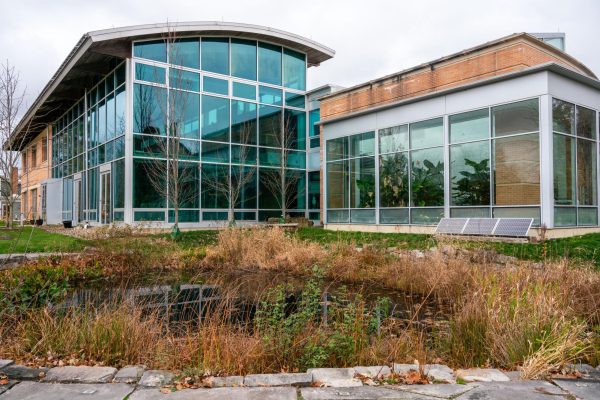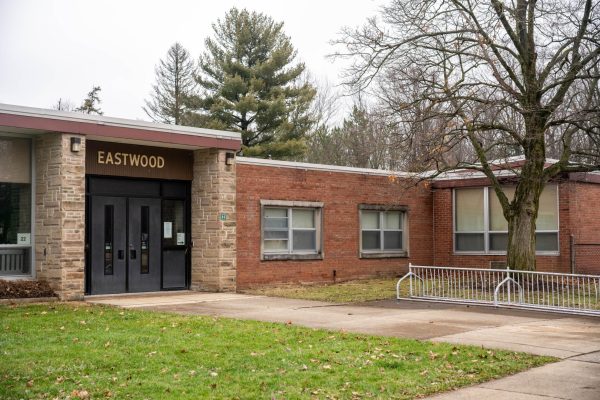Students for Energy Justice Hosts Atlanta Forest Defenders
Editors’ note: The protesters often confront law enforcement as a result of their activism, and are known within their communities by “camp names,” such as Trench Foot, Sumac, and Marinara. This story will refer to individuals by the camp names that they use in their daily life at the encampment.
Four organizers from the Defend the Atlanta Forest encampment gathered in Wilder Hall on Tuesday to discuss their activism with interested Oberlin students. The Defend the Atlanta Forest campaign uses direct action tactics to oppose the construction of a police compound and soundstage in the largest contiguous forest in Atlanta. Oberlin’s Students for Energy Justice planned the event, compensated the organizers for their talk, and voiced support for their efforts.
Following a meditative exercise that aimed to ground students in their bodies and within a global interconnected system, Raina, one of the guest speakers, read a statement from a Muscogee traditional chief. The statement referenced the displacement of the Muscogee Creek people from their traditional lands in what is now Atlanta and called for listeners to learn how to become better stewards of this stolen land. The four members of the group then explained how the construction project is a continuation of the country’s history of colonial and racial violence.
The Atlanta Police Department is pursuing a plan to claim roughly 300 acres of forest — converting 85 acres into a tactical training facility while maintaining 265 acres for green space. The facility, known to the activists as “Cop City,” would draw police recruits from around the nation. Among its proposed features is a mock city street, where recruits could practice using riot gear. Additionally, Atlanta’s DeKalb County is attempting to sell another parcel of nearby forested public park to a major film and TV production company; Blackhall Studios would clear-cut forest to create the state’s largest soundstage.
These proposed plans would be located directly adjacent to the grounds of the Old Atlanta Prison Farm. The site was the focus of a 1980s ACLU lawsuit, which alleged that the prison farm used inhumane punishment tactics against its prisoners, particularly Black and Brown people. Already, the police have repossessed the site of the ruined farm — which is being transformed by a burgeoning new growth forest, to construct a firing range. To the many residents of Atlanta — the “city in the forest” — the land repossession was unwelcome news.
“There is a large grassroots movement in Atlanta,” said Trench Foot, one of the organizers. “There are a lot of people who are very upset about the Cop City and about the movie studio. And I think that the convergence of these forest defense tactics with urban mass organizing tactics is really special.”
For Oberlin’s SEJ, supporting this campaign aligns with its central ideology; the radical environmental student group supports direct action tactics, especially those that resist the power of the fossil fuel industry. The tactics used in Atlanta include blockades, tree-sits, as well as other forms of direct action against the ongoing construction efforts.
“These folks don’t make money,” said members of SEJ in a group statement. “The work they do is counter to anything that any business would pay for. … Being affiliated with the College and being connected to the College’s resources, I think, is both a big privilege and comes with a big onus and a big responsibility to give it away as much as possible. And I think this is an example — this talk is incredible. And Oberlin students wanna hear about this and in return, this will feed people or buy climbing gear or whatever else needs to happen.”
One of the speakers, Marinara, is a former member of SEJ. Marinara’s journey to Atlanta began with a similar radical encampment in West Virginia, the Appalachians Against Pipelines. Through SEJ, Marinara learned about and connected with organizers at the AAP movement. AAP similarly uses direct action tactics to resist the creation of the Mountain Valley Pipeline, a natural gas pipeline that is currently under construction and planned to range from south Virginia to northern West Virginia. Members there have conducted one of the longest tree-sits in the country — 932 days — and have helped deter the construction of the environmentally devastating and climate-changing pipeline.
“The sort of informal community of friends that we made fighting the pipeline ended up moving down to Atlanta to fight Cop City as the pipeline is not being built currently,” Marinara said. “And so I decided to go and join my friends doing stuff that mattered to me. It was through amazing networks of trust and affinity.”
As they closed their presentation, Trench Foot called on listeners to find their frontline — where one can make the biggest impact and resist apathy and complacency in the midst of the worsening climate crisis.
“Atlanta has been identified as one of the most stable cities in the so-called U.S. against the climate crisis, in large part due to its urban forest setup,” Trench Foot said. “It’s also a very likely destination for climate refugees, from the coasts and from increasing climate chaos. As the climate crisis grows worse, and with the rise of the far right, and just sort of the everyday disasters of capitalism, I think that the police are going to become more emboldened, that they’re going to become more repressive and they’re going to be used by people who are already wealthy and powerful in society to hoard what resources are left. This is bad and we should work to dismantle these systems as quickly as possible.”






